Home » Articles posted by Paul Gerald Williams (Page 2)
Author Archives: Paul Gerald Williams
Spring Term at Exeter!
Welcome to the Department of English & Film at Exeter!
My name is Dr Paul Williams and I’m a Senior Lecturer in Twentieth-Century Literature – I’m also one of the Admissions Officers in the department. Over the course of the Spring Term I’ll be regularly blogging about activities on campus, the research that staff do, and what keeps our students busy. And I’ll say a bit about all the opportunities we offer at Exeter, academic and otherwise, hence my trip to the sea below!
Right now everything is in full swing: essays are being marked, students are going on trips, and dissertations are being written. This blog will give you a peek inside our lecture theatres, seminar rooms, libraries, and archives. You’ll hear from staff and students alike!
We can’t wait to meet our Offer Holders at one of the Offer-Holder Visit Days in February or March, but if you can’t make it to Exeter in person, hopefully this blog will give you a taste of what life here is like!
A Trip Down the Estuary…
I thought I’d start with one of my favourite things to do, which is walk to the town of Exmouth to see the sea. The South-West Coastal Path gives good access to the coastline all along the Devon coast and the journey from Exeter to Exmouth gives you fantastic views of the Exe estuary. Starting in the centre of Exeter it takes me around 2 hours 30 minutes to walk to Exmouth, but you can cycle down the estuary too, or use the train service (c.25 minutes).
Today encapsulated all the weather you might expect in Devon in January. It was dry and good weather for the bird watchers outside Topsham…
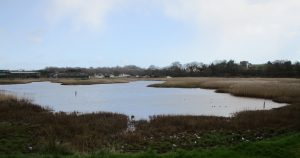
Then the hail started…
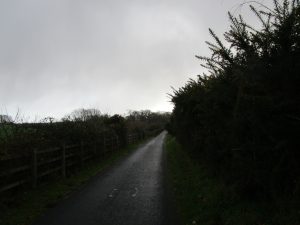 And the wind picked up…
And the wind picked up…
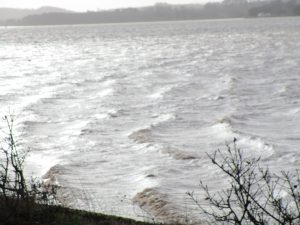 But the sun finally broke through before Exmouth…
But the sun finally broke through before Exmouth…
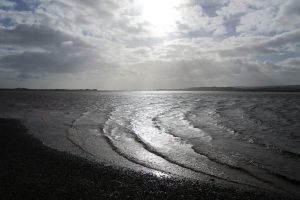 And it was all worth it at the end!
And it was all worth it at the end!
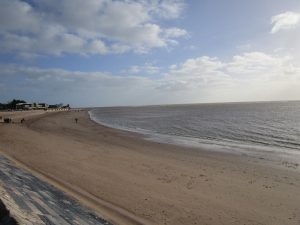
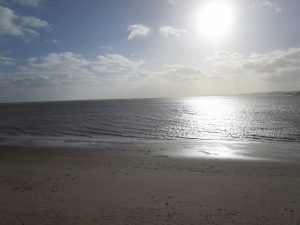
See you back here for more news from English at Exeter!
Spring Term Reflections
Dear reader,
This is Lisa, one of the Admissions Officers in English and Film at Exeter. I’m writing to say hello and welcome to everyone visiting this site for the first time, and welcome back to those returning! I hope you enjoy exploring some of the posts here about student life and what studying with us is like.
We’ve just reached the end of our second teaching term here, so I wanted to take a moment to reflect on some of the great things that have happened this term, and give you a flavour of what a spring semester is like at Exeter.
Dissertation destinations
Many of our final-year students have been working on their dissertations across the term, moving from their early planning stages to writing a complete draft. I’ve worked with students this year on topics ranging from the representation of gender ideals in women’s magazines of the 1950s; a postmodern reading of Nightcrawler; an exploration of gender, the posthuman and facial expression in Ex Machina; and the alcoholic woman in the novels of Jean Rhys. I’ve been hugely impressed this year by the depth and quality of the work and ideas final-year students are producing, and the passion they bring to each tutorial.
Archival adventures with the second years
I’ve worked with many of our second-year students on the module EAF2510 Adaptations, where we’ve been exploring page-to-screen transformations with texts and writers that range from Dickens to Frank Miller. We’ve been in and out of the archives, looking at magic lantern slides as early visual adaptations of ‘A Christmas Carol’ and marketing materials for David O. Selznick’s adaptation of Daphne Du Maurier’s Rebecca (1938 / 1940), and students have been writing their own treatments, pitching big screen adaptations of short stories by writers such as Katherine Mansfield, Edgar Allen Poe and Ernest Hemingway. We ended the module with Throne of Blood – Akira Kurosawa’s spectacular and spectacularly dark transcultural adaptation of Macbeth.
Module choice musings with our first years
I’ve also had a steady stream of first-year personal tutees in and out of my office making their module choice selections for their second year of study. It’s been great to chat with them about the possibilities in front of them, and hear about their developing interest in different areas of study, with some students rapidly falling in love with creative writing, or film, or Renaissance literature. Quite a lot of students are also excited about taking options in other disciplines, which anyone can do through modularity: I’ve been helping these tutees think about which modules might complement their studies in English.
Talking all things film
One of my personal favourite things this term has been the launch of Film Talk, effectively ‘book club’ style event for cinema fans. It’s open to anyone across the university, and is a non-hierarchical space in which students and staff gather to chat about the latest big and small screen releases, led by a student speaker who kicks things off with their personal review. This term we talked about Star Wars: The Last Jedi; Three Billboards Outside of Ebbing Missouri; The Shape of Water; I, Tonya and Annihilation. Mark Kermode even joined us for the launch and gave his views on The Last Jedi! It’s been wonderful to grow this little community of people passionate about movies, and see where the conversation goes at each meeting.
Research matters!
It’s also been a great semester for inspiring new research from our English staff. Dr Joe Crawford’s research on female Romantic poets has shed fascinating new light on the use of opium for its “tranquilising power” and “calming” properties to aid their writing. Dr John Wedgwood Clarke’s poetry, inspired by the works of Cornish author William Golding, were featured as part of a new exhibition at the Siobhan Davies Studies in London by the filmmakers Webb-Ellis. Professor Joe Kember’s research into magic lantern histories has led to the digitization of thousands of fragile images of Devon. Many of our staff presented their work at international conferences, published new books and new articles; whilst our postgraduate students have achieved some fantastic things this term, including the shortlisting of MA Creative Writing student Kim Squirrel for the inaugural Dinesh Allirajah Prize for Short Fiction.
Looking ahead
So now it’s Easter, and many of our students are taking a well-needed break whilst mulling over some of their current and upcoming assessments (term 3 is our assessment period, where many students will be undertaking examinations). We’d like to wish you a Happy Easter: watch this space for further news about what we and our students are up to!
We Are Researchers
Staff regularly give Wednesday lunchtime seminars on their latest research. Here are some photos of Chris Ewers and Debra Ramsay talking about “War and Sport in Media”:
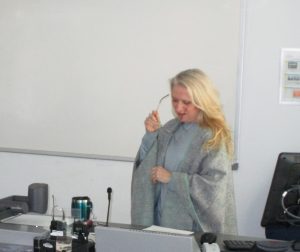
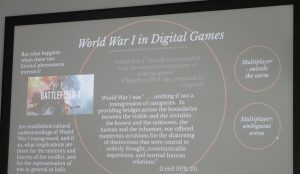
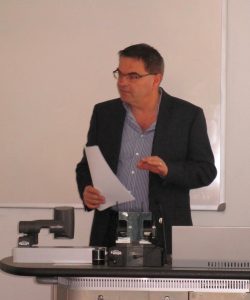
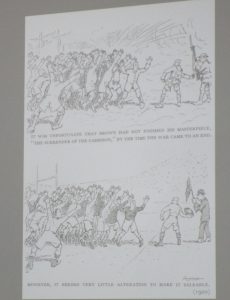
We Are Students
Last weekend the English Society went to Budapest. Look who they ran into outside Starbucks!
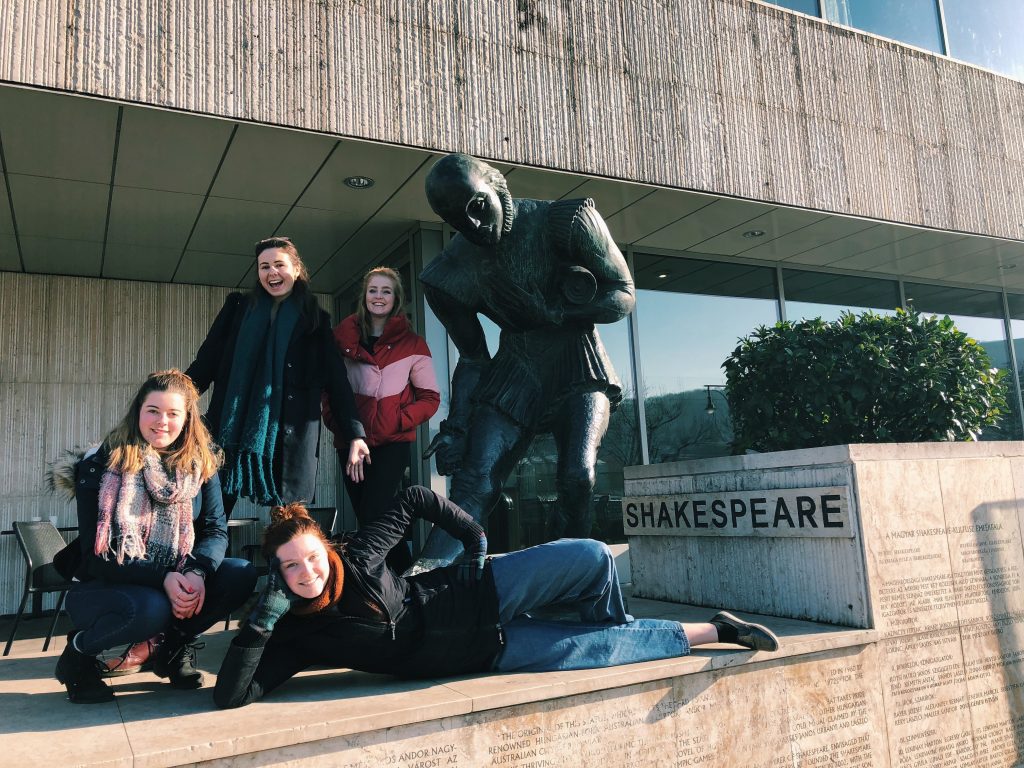
Can’t help gravitating towards the books. They must have been making a start on the reading for second-year module Crossing the Water: Transatlantic Literary Relations.
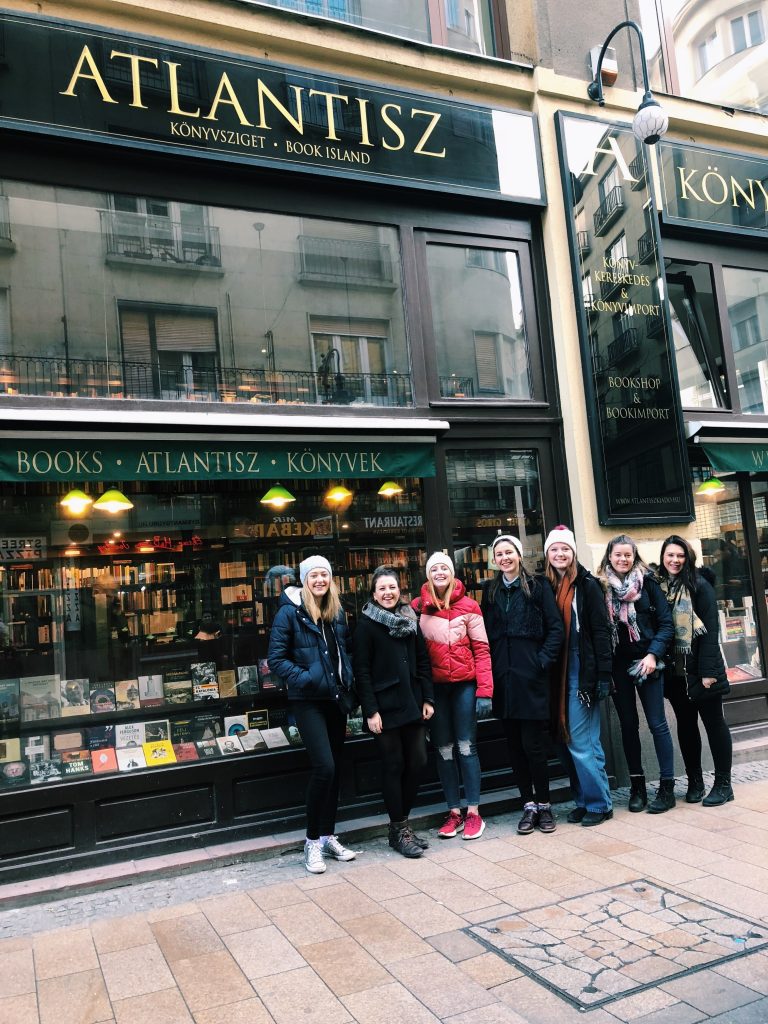
Photos courtesy of Loren Smith, 2nd Year BA English